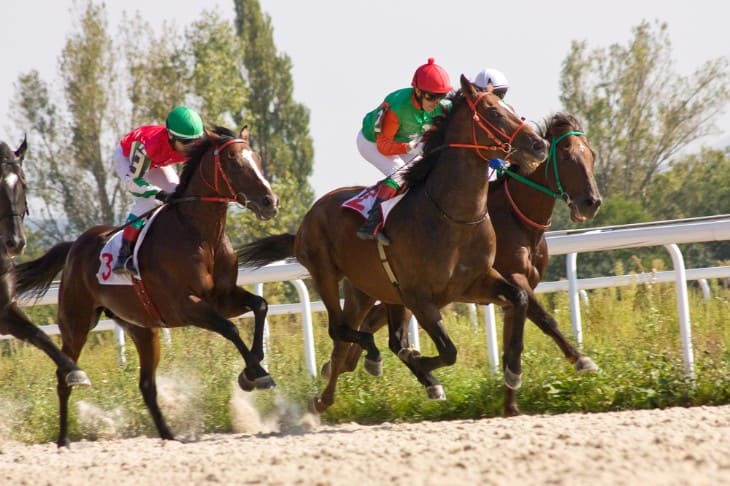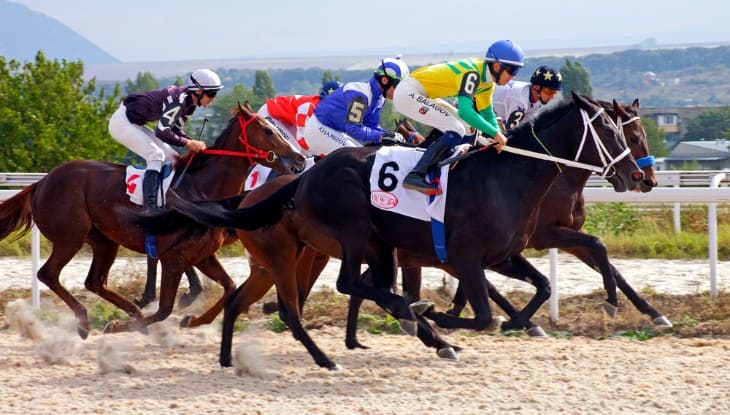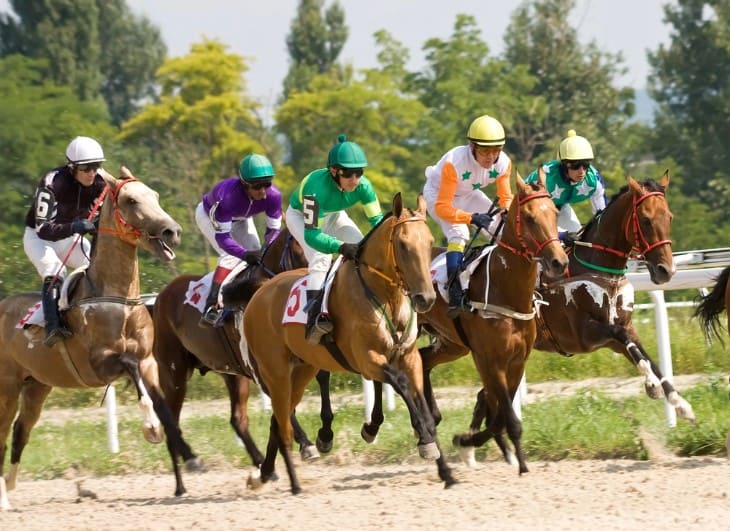- Breeding for Speed: The Science Behind Racing Horses
- Role of Pedigree in Horse Racing
- Modern Breeding Techniques for Racing Horses
- Nutrition and Diet: Fueling Speed
- Training Programmes for Elite Racehorses
- Environmental Influence on Horse Development
- Preventing And Managing Injuries On Racing Horses
- The Psychology Of A Winning Racehorse
- Veterinary Care for Racing Horses in the Modern Era
- Ethics in Horse Racing
- In Summary
Breeding for Speed: The Science Behind Racing Horses
Breeding racehorses is a complex and detailed process requiring in-depth genetic knowledge. This process revolves around searching for a genetic pattern predisposing a horse to speed and endurance. Genetic factors are of the utmost importance in determining the racing ability of horses, including various inherited traits like muscle type, lung capacity, and even tempers that are key to high performance by a racehorse.
Scientists and breeders have been probing into the DNA of outstanding racers to discover genes that make them exceptional. Identifying the 'speed gene' represents a milestone in equine genetics. Known scientifically as the myostatin gene, this gene affects muscle development and has been associated with sprinting ability. Selective breeding aims to produce young ones who inherit these attributes; hence, horse riders pair animals with desirable genetic traits.
Role of Pedigree in Horse Racing
Horse pedigree is everything when it comes to racing. Pedigree means tracing back the line through generations of thoroughbreds. The pedigree offers clues about certain abilities passed on from generation to generation, as some characteristics run in families. For example, progeny competently participating in long-distance races may show their natural ability for endurance, too.
It involves going through the racing histories as well as breeding records for horses' predecessors culminating into parents:
- Race Records: Race records can elucidate possible strengths or weaknesses based on how any ancestor performed in different races.
- Breeding patterns: mating sires with dams (females) is usually done to combine important aspects from both sides
This analysis helps breeders decide which horses to mate and produce offspring with a blend of speed, endurance, and other desirable traits. The pedigree analysis examines what has happened and presents an idea about how well or poorly something was done for tomorrow's racing.
Modern Breeding Techniques for Racing Horses
Contemporary methods within Horse Breeding for Racing have revolutionised the industry. These advances go beyond genetic analyses to incorporate various reproductive technologies. Horse breeders now use artificial insemination (AI), embryo transfer, and even cloning as reproduction tools. The techniques aim to achieve maximum benefit in terms of genetic potential and conservation of valuable genetic lines.
Primary up-to-date breeding methods include:
- Artificial Insemination (AI): This enables breeders to access semen from stallions anywhere worldwide.
- Embryo Transfer: For mares with superior genes but unable to bring a pregnancy to full-term.
- Genetic Testing: helps identify particular genes responsible for speed and endurance while choosing a proper animal couple.
- Cloning: Although controversial and less common, this allows one to reproduce the genetic material of an outstanding horse.
Nutrition and Diet: Fueling Speed
Feeding racehorses is essential in their development and racing performance. Nutrition is tailored for each racing horse to meet high energy requirements during training or racing, ensuring its good health. A racehorse's feeding regime usually consists of carbohydrates, proteins, fats, vitamins, and minerals, all of which function differently to maintain its overall wellbeing and improve its physical potential.
Carbohydrates are the primary energy source, mostly from good fodder and grains. Protein is crucial for developing and repairing muscles, especially amongst young growing horses. Fats provide a highly concentrated power source and are increasingly recognised for supporting endurance. It is necessary to carefully balance the vitamins and minerals needed for many physiological functions not to develop deficiencies or toxicities that impede health and performance in horses.

Training Programmes for Elite Racehorses
Elite racehorse training programmes are as important as the horses' genetic make-up. A well-structured training programme is necessary to improve the horse's speed, stamina, and racing intelligence. These regimens are tailor-made and consider the horse's age, breed, disposition, and physical status. A typical training program includes cardiovascular workouts, strength-building exercises, and skill development, among other things.
Cardiovascular workouts mainly encompass track work, during which horses' speeds and endurance levels increase gradually. Strength building may include hill work and swimming, which help develop the muscles without adversely affecting the legs of the horse in question. Skill development focuses on sharpening racing techniques like starting from gates and pacing up or down their speed accordingly when directed by a jockey, among others. The goal is to ensure that, physically and mentally, such horses are ready for competitive racing.
Environmental Influence on Horse Development
Horse development as an athlete for racing performance is greatly influenced by the environmental attributes in which they are nurtured or trained. Factors such as weather conditions, type of land, and place of living can determine how well a particular horse grows both physically and mentally. Horse Breeding for Racing emphasises creating an optimal environment to nurture the potential of horses.
Major environmental factors include:
- Climate: Horses can adapt to different climate regions; however, extreme conditions may influence their training and health.
- Terrain: The grounds involved during horse training affect a horse's musculoskeletal development and adaptability to various racetracks.
- Stabling Conditions: Quality stabling provides a safe, comfortable environment crucial for the healthy, restorative sleep the animal needs.
- Social Interaction: Because horses are social animals, their conduct, including stress levels, could be influenced by other horses around them.
By manipulating these aspects, breeders and trainers ensure that race horses remain healthy physically and psychologically, finally ensuring top performance at the track.
Preventing And Managing Injuries On Racing Horses
Prevention and management of injuries are crucial in horse racing as they determine its longevity and welfare. With this being a high-intensity activity, racehorses are prone to injuries ranging from minor strains to those that end their careers. A comprehensive method for preventing injuries includes regular veterinary checkups, proper training, and care.
Effective injury management is multidimensional. It involves prompt diagnosis and treatment, rehabilitation, and sometimes surgical intervention if required. Rehabilitation may include physiotherapy, hydrotherapy, and specific exercise patterns that suit the particular requirements of the horses concerned. The main aim is to get horseback racing in top shape while reducing re-injury chances.
The Psychology Of A Winning Racehorse
The psychology behind a winning racehorse is often ignored when discussing horse breeding for racing. A strong-willed racehorse is no less important than one with physical attributes typical of a champion. Horses are intelligent animals; their temperament and behaviour can significantly impact their performance on the track.
Racehorse training also involves psychological conditioning. One has to introduce the horse to the racing environment: noises, crowds and starting gates. One must train such a horse to remain calm and concentrated during races. Trusting relationships with its trainer, jockey, and handlers is essential. This is because mentally balanced and confident horses tend to perform better since they are more willing and able to tap into their physical powers in a race.

Veterinary Care for Racing Horses in the Modern Era
The first and utmost importance is to ensure that racing horses are in good health. These animals have seen notable progress in veterinary medicine customised for them as athletic animals. Significant technological developments have changed how injuries are diagnosed, treated, and prevented.
Some of these improvements include:
- Diagnostic Imaging: Advanced imaging techniques such as MRI (Magnetic Resonance Imaging) and CT – scans allow veterinarians to identify injuries more accurately than ever.
- Regenerative Therapies: Stem cell therapy and platelet-rich plasma (PRP) therapy may accelerate wound healing.
- Laser Therapy: Low-level laser therapy can manage pain and repair tissue damage.
- Minimally Invasive Surgery: One technique is to use advanced surgical methods that are less invasive so patients recover quickly.
These advances have improved the overall welfare of racehorses and extended their careers, thus allowing them to compete at the highest levels for longer durations. As the industry changes, so does society's commitment to ensuring a better life for these beautiful creatures.
Ethics in Horse Racing
While horse breeding for racing has an allure about seeking excellence, it also comes with ethical issues that require thoughtful consideration. For instance, recent years have witnessed horse racing come under scrutiny due to concerns regarding how both on-track and off-track racehorses are treated by their owners.
Hence, some main areas of ethical horse racing considerations include:
- The welfare of Horses: The primary concern should be horses' well-being, including avoiding cases where these animals experience excessive stress, overtraining, or harsh treatment.
- Medication and Doping: Medication use is highly regulated, and there is a need to discuss performance-enhancing drugs that can be employed in races, ethically speaking.
- Retirement and Post-Racing Care: A decent retirement plan and continuous care for retired racehorses are indispensable.
- Transparency: Ethical horse racing practices demand we know who owns a specific horse, where it was bred, and its race record.
These ethical considerations are at the heart of sustainability and public opinion regarding the sport. This has attracted attention from people involved in horse racing and those in authority as they try to maintain its integrity.
In Summary
Thus, breeding for speed in racehorse science involves several factors that make it an intriguing journey. It incorporates genetics, pedigree analysis, contemporary breeding techniques, nutrition, training programs, ecological influences, injury prevention strategies, psychology, economics, veterinary practices, and ethical issues. All these elements help to create exceptional racehorses capable of attaining greatness on the track.








